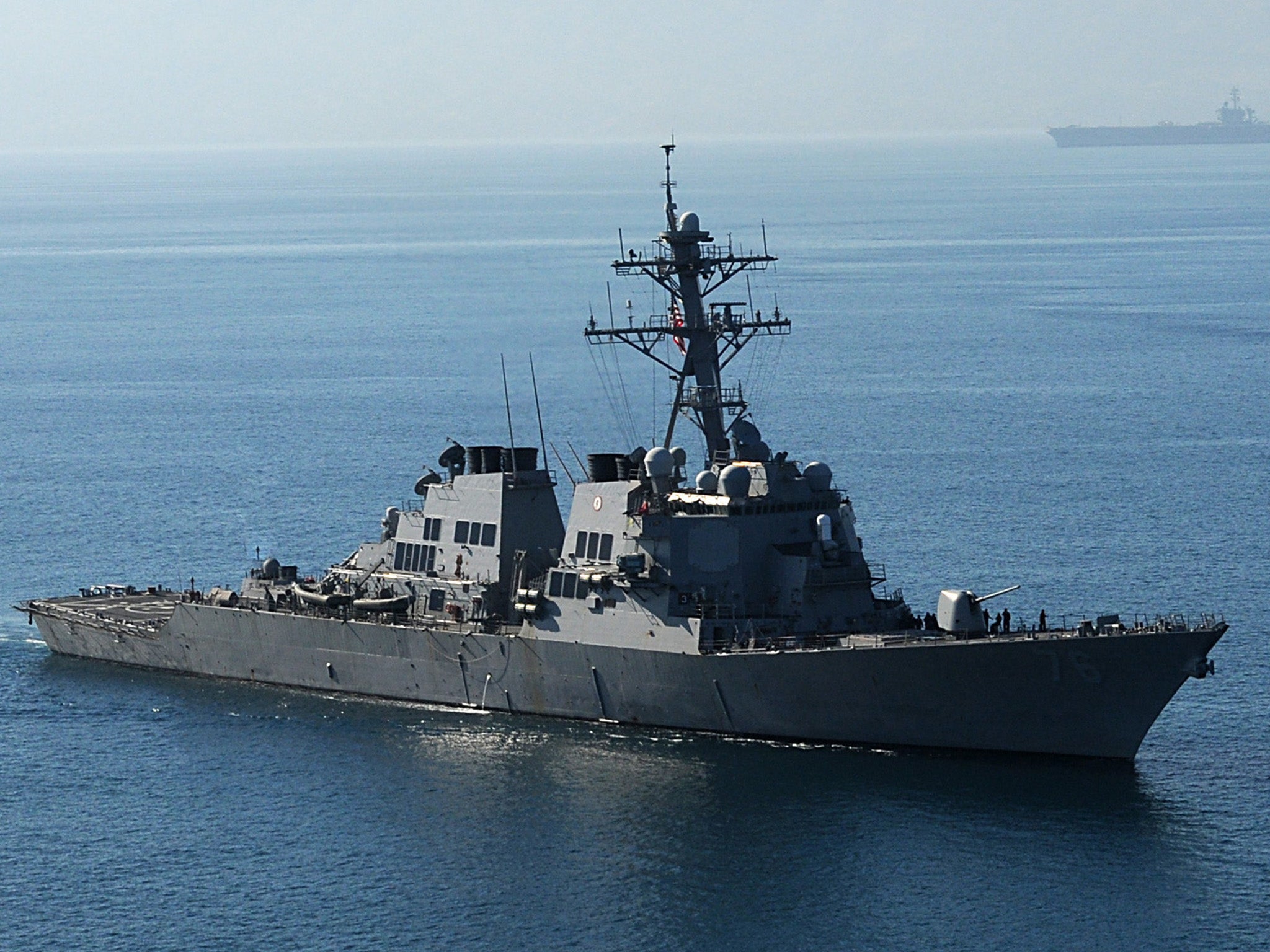China rages over US warships sailing near disputed islands, saying move 'seriously infringed' its sovereignty
Defence ministry says Chinese vessels and aircraft warned American ships to leave

Your support helps us to tell the story
From reproductive rights to climate change to Big Tech, The Independent is on the ground when the story is developing. Whether it's investigating the financials of Elon Musk's pro-Trump PAC or producing our latest documentary, 'The A Word', which shines a light on the American women fighting for reproductive rights, we know how important it is to parse out the facts from the messaging.
At such a critical moment in US history, we need reporters on the ground. Your donation allows us to keep sending journalists to speak to both sides of the story.
The Independent is trusted by Americans across the entire political spectrum. And unlike many other quality news outlets, we choose not to lock Americans out of our reporting and analysis with paywalls. We believe quality journalism should be available to everyone, paid for by those who can afford it.
Your support makes all the difference.China has reacted angrily after two US warships sailed near the disputed Paracel Islands in the South China Sea, describing the move as a “provocation” and accusing America of committing a serious infringement of the country’s sovereignty.
A statement issued by the defence ministry said Chinese vessels and aircraft warned American ships to leave because they had entered its territorial waters in the South China Sea, through which nearly $5 trillion in ship-borne trade flows, without permission. The move “contravened Chinese and relevant international law, seriously infringed upon Chinese sovereignty [and] harmed strategic mutual trust between the two militaries”, it said.
It described the Chinese military’s resolve to defend the country’s sovereignty as “unswerving”.
US officials told Reuters the USS Higgins, a guided-missile destroyer, and the USS Antietam, a guided-missile cruiser, came within 12 nautical miles of the Paracel Islands – a string of islets, reefs, and shoals – over which China has had territorial disputes with neighbouring countries.
The operation was the latest attempt by US President Donald Trump’s administration to counter what Washington sees as Beijing’s efforts to limit freedom of navigation in the strategic waters. The move comes just days after the president cancelled a 12 June summit in Singapore with North Korean leader Kim Jong-un, a relationship in which China has a vested interest.
North Korea relies on China, one of its handful of allies, for trade in essentials like fuel, seafood, textiles and financial services. Mr Kim and Chinese President Xi Jinping have met several times, the latest meeting taking place in China.
The South China dispute also puts further strain on US-China ties amid a trade dispute between the world’s two largest economies. Mr Trump has said he wants to reduce Washington’s trade deficit with Beijing and make the relationship more “reciprocal”.
Joshua Kurlantzick, a senior fellow for Southeast Asia at the Council for Foreign Relations, told The Independent previously that while the US and other southeast Asian nations want to “preserve freedom of navigation” in the hugely important body of water that accounts for nearly one-third of maritime global trade, China is looking to increase its control over several small islands, some of them man-made.
Satellite photographs taken on 12 May showed China appeared to have deployed truck-mounted surface-to-air missiles or anti-ship cruise missiles at one particular outpost, Woody Island, and earlier this month, China’s air force landed bombers on disputed islands and reefs as part of a training exercise in the region. It triggered concern from Vietnam and the Philippines, who do not think China has territorial rights that far into what they consider international waters.
China has been developing on the reefs and atolls despite a ruling by the Permanent Court of Arbitration in The Hague, which had said there was no legal basis for China’s maritime claims that extended approximately 1,000 miles beyond its shore to waters abutting Taiwan, the Philippines, Malaysia, Brunei, and Vietnam.
Critics of the military operations, known as a “freedom of navigation”, have said they have little impact on Chinese behaviour and are largely symbolic.
The US military has a long-standing position that its operations are carried out throughout the world, including in areas claimed by allies, and that they are separate from political considerations.
The US military did not directly comment on Sunday’s operation, but said US forces operate in the region on a daily basis. “We conduct routine and regular Freedom of Navigation Operations (FONOPs), as we have done in the past and will continue to do in the future,” the US Pacific Fleet said in a statement.
Pentagon officials have long complained that China has not been candid enough about its rapid military build-up and using South China Sea islands to gather intelligence in the region.
In March, a US Navy destroyer carried out a “freedom of navigation” operation close to Mischief Reef in the Spratly Islands.
Chinese officials have accused Washington of viewing their country in suspicious, “cold war” terms. The US has said it would like to see more international participation in freedom-of-navigation operations in the South China Sea.
However, experts have said China’s economic power in the region has stopped many countries in the Association of Southeast Asian Nations (Asean) from further provoking Beijing. However, Vietnam has stood up publicly to China in the dispute, particularly after the Philippines’ President Rodrigo Duterte appeared to take a softer stance on the matter.
Additional reporting by agencies
Join our commenting forum
Join thought-provoking conversations, follow other Independent readers and see their replies
Comments